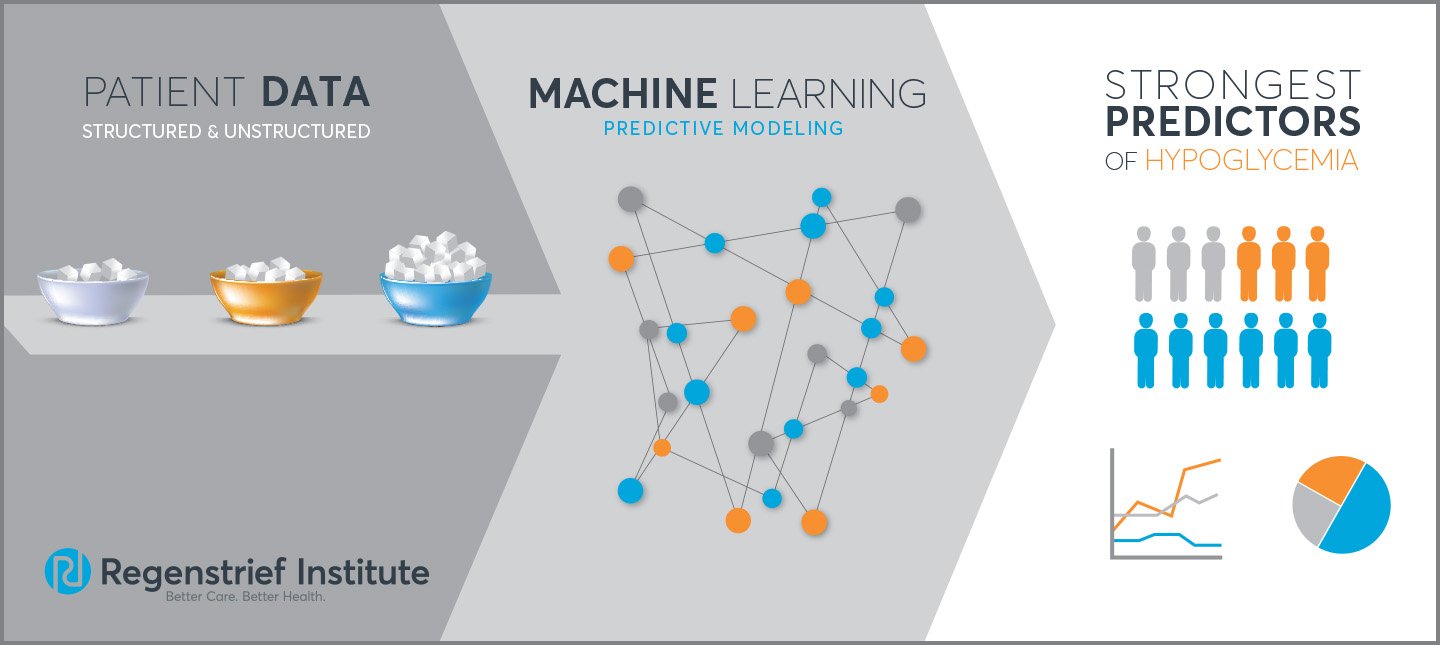A new study identifies the risk factors that could help healthcare providers recognize patients being treated for diabetes who are most likely to have low blood sugar. The predictive risk model, developed and tested by researchers from Regenstrief Institute, Indiana University School of Medicine and Merck, known as MSD outside of the United States and Canada, is the first to combine nearly all known and readily assessed risk factors for hypoglycemia.
Many patients with diabetes, especially those with recurring episodes of low blood sugar, are unaware when it occurs, despite the risk of serious adverse events including cognitive impairment, coma and death. Being able to identify patients at high risk may provide an opportunity to intervene and prevent hypoglycemia as well as long-term consequences.
Diabetes is one of the most common non-communicable diseases in the world. The U.S. Centers for Disease Control and Prevention estimate that more than 30 million Americans had diabetes in 2015. Low blood sugar, known as hypoglycemia, occurs in 20 to 60 percent of patients with diabetes. It has substantial negative effects on a person’s mental and physical health, including the cardiovascular system.
According to the study, the strongest predictors of hypoglycemia are
- Recent infections
- Using insulin other than long-acting insulin
- Recent occurrences of hypoglycemia
- Dementia
The variables associated with the lowest risk for low blood sugar were long-acting insulin in combination with certain other drugs, as well as being 75 years of age or older, which the authors noted was surprising.
“Knowledge of these factors could assist clinicians in identifying patients with higher risk of hypoglycemia, allowing them to intervene to help their patients in lowering that risk,” said Michael Weiner, M.D., MPH, director of the Regenstrief Institute William M. Tierney Center for Health Services Research and the senior author of the study. “Some factors influencing hypoglycemia may not be immediately obvious. In addition, reassessing hypoglycemia risk as a patient’s health status changes may be important as new factors are identified.”
Study Methods
In this retrospective cohort study, researchers gathered data from 10 years of electronic medical records covering nearly 39,000 patients with diabetes who received outpatient care at Eskenazi Health in central Indiana. Study participants were 56 percent female, 40 percent African-American and 39 percent uninsured. The researchers used laboratory tests, diagnostic codes and natural language processing to identify episodes of hypoglycemia.
The scientists found that natural language processing was useful in identifying hypoglycemia because there were not always laboratory tests to confirm the episode. Instead, hypoglycemia was often recorded only in narrative clinical notes. The study authors believe that their risk prediction model, incorporating natural language processing, could be useful to researchers, clinical administrators and those who are measuring population health.
Future applications
“This study has implications for clinical support,” continued Dr. Weiner. “The predictive model could lead to changes in practice as well as new strategies to help patients lower their risk of hypoglycemia.”
Dr. Weiner and his team are now studying the implementation of a clinical decision support tool that uses information from electronic health records to alert clinicians when their patients have hypoglycemia risk factors. In addition, they are conducting an outpatient study that uses wearable devices to monitor and record the actions and continuous glucose levels of people with diabetes. The information collected includes physical activity, diet and adherence to medication regimens, data typically not available in medical records. The goal is to identify patterns that allow healthcare providers to predict hypoglycemia earlier.
“Predictive modeling of hypoglycemia for clinical decision support in evaluating outpatients with diabetes mellitus” was published online June 25 in Current Medical Research and Opinion, a peer-reviewed journal. Funding for the research was provided by Merck & Co., Inc.
In addition to his appointment at Regenstrief, Dr. Weiner is Chief of Health Services Research and Development and a principal investigator in the Center for Health Information and Communication, Richard L. Roudebush Veterans Affairs Medical Center and a professor at Indiana University School of Medicine.
The first author of the article is Xiaochun Li, PhD, associate professor of biostatistics, IU School of Medicine.
Other authors from Regenstrief are Zuoyi Zhang, PhD; Jonathan Cummins, M.S.; and Jarod Baker, M.S.
Additional study authors are Shengsheng Yu, PhD; Larry Radican, PhD; Samuel S. Engel, M.D.; Kristy Iglay, PhD; Jeremy Leventhal M.S.; Jon Duke, M.D.; Kimberly G. Brodovicz, DrPH; Ramachandra G. Naik, M.D., D.M; Arnaub K. Chatterjee MHA, MPA; and Swapnil Rajpathak, MBBS, DrPH.
About Regenstrief Institute
Founded in 1969 in Indianapolis, Indiana, the Regenstrief Institute is a local, national and global leader dedicated to a world where better information empowers people to end disease and realize true health. The Regenstrief Institute and its researchers are responsible for a growing portfolio of major health care innovations and studies. Examples range from the development of global health information technology standards that enable the use and interoperability of electronic health records for better care to improving patient-physician communications, to the creation of models of care that inform practice and improve the lives of patients around the globe.











